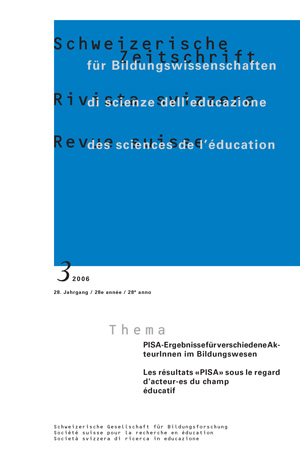Effects of school context and adaptive teaching competency on self-regulated learning
DOI:
https://doi.org/10.24452/sjer.28.3.4735Abstract
The ability to regulate one’s own learning process is of high importance for adult self-directed learning. Self-regulated learning (SRL) needs to be understood as both, a condition as well as a goal of learning in school contexts. This contribution examines the results of PISA in 2003 analyses of the effects of type of school and school achievement on self-regulated learning. The investigation reveals that the «big-fish-little-pond-effect» (BFLPE; Marsh, 1987) occurs in Swiss schools too. Students with the same level of competency in mathematics have a lower mathematical self concept when attending a school with good results compared to students at a less successful school. Considering the substantial influence of self-regulated learning on learning outcomes, a second study examines the contribution of teachers to foster self regulated learning. 49 teachers and their students took part in «Adaptive Teaching Competency», a research project which was supported by the Swiss National Science Foundation. Adaptive teaching competency is defined as the teacher’s ability to adjust lesson planning as well as teaching performance to the diverse abilities of students in class, thus achieving optimal conditions for comprehensive learning. The results indicate that the competence of teachers in the dimensions of diagnosis and teaching methods is vital to the promotion of domain specific interest and self concept. Adaptive teaching competency is closely linked to the context of the classroom.
Downloads
Downloads
Published
Issue
Section
License
Copyright (c) 2006 Christian Bruehwiler

This work is licensed under a Creative Commons Attribution 4.0 International License.



